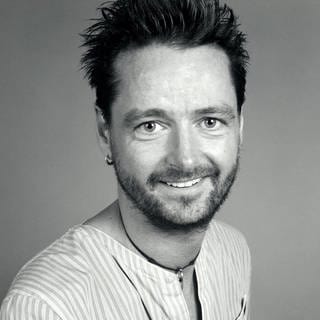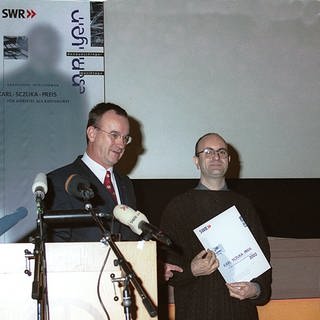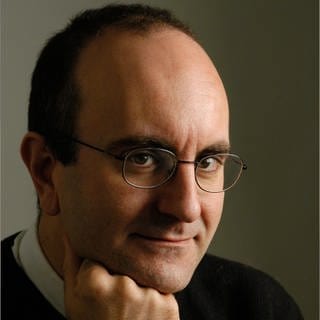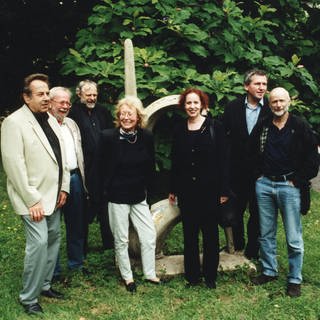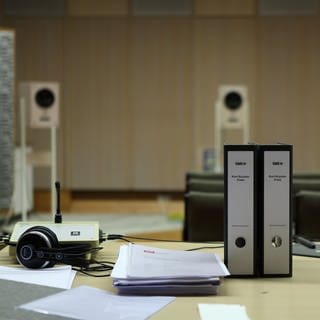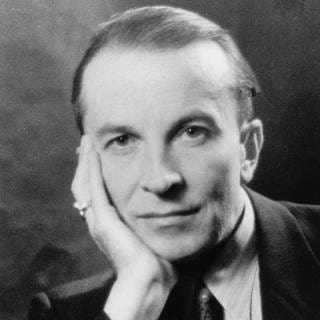The "I Ching" is not just an oracle. Its wisdom encompasses all fields of knowledge. The acoustic dramaturgy based on the "I Ching" signs is mostly based on a very sudden, detourless presentation of the images suggested by the titles, basically on a transformation of the literary images into sound paintings.
In other cases, I have tried to explore the meaning of the characters more deeply. My aim is to achieve something exemplary through 64 short audio images that can stand for a kind of symbol of the human: comparable to 64 different dreams that unfold as pure images and yet at the same time conceal deeper meanings that relate to human archetypes.
At the 56th International Radio and Television Competition Prix Italia, the 64 sound miniatures "Il Tempo Cambia" by Stefano Giannotti received a "Special Mention" in the category of Radio (Music/Composed Work).
Linda Matteucci: Flutes
Marco Donatelli: Bassoon
Lara Vecoli: Cello
Giuliana Menchini: Soprano
Stefano Giannotti: Guitars, Keyboards, Harmonium, Drums, Voice, Harmonicas, Jaw Harp, and Piano
Additional Voices and Sounds: Mariola Krajczewska, Matilde Giannotti, Renato Checcherelli, Mohsen Yousefi, and Marco Sodini
Realization: Stefano Giannotti
Production: Author's Production 1997-2001
Partial Premiere: Australian Broadcasting Corporation, Sydney - "The Listening Room", July 16, 2001
Duration: 55'22
Online Matrix 'Il tempo cambia'
In the I Ching, the 64 characters traditionally unfold their meaning in a matrix of 8x8 characters. The combination of characters - both linear and random - can be playfully traced on the multimedia online version of Stefano Giannotti's "Il tempo cambia".
History of the radio play
In 1997, Giorgio Lazzarini (another composer from Lucca) and I were invited by the choreographer Roberto Castello to compose 32 soundscapes on the themes of the "I Ching" for his performance '64 Variations of Time' (Part 1). Roberto wanted to develop a series of short choreographies to be performed by three dancers in a container measuring 8m x 4m x 2.5m placed in one of the squares of our city. Each side of the container would be completely closed - except for some holes through which the audience could watch the performance from different points, resembling a peep-show. None of the spectators would be told that the pieces performed were inspired by the "I Ching." The duration of each miniature (2 minutes) would determine the rhythm of the performance, like a sort of musical clock.
The time changes...
I composed fourteen pieces which I named "Il tempo cambia," meaning "The time changes," but also "The weather changes." Giorgio also composed fourteen pieces, and we designed the remaining four together. By random selection, we decided which pieces each of us would compose. The performance premiered on September 5th at Piazza dell'Anfiteatro in Lucca. While working on this project, I got the impression that this series of fourteen pieces could potentially transform into an autonomous piece that could be performed in a theater. A year later, the opportunity arose in Berlin: The Ensemble Zwischentöne, under the direction of Peter Ablinger, asked me to compose a piece. I decided to reconceptualize the I-Ching miniatures. The new version now included voices, two flutes, saxophone, marimba, vibraphone, piano, bandoneon, and tape recordings, and premiered at the Ballhaus Naunynstrasse - one of Berlin's most important alternative concert halls. The ironic character of the performance was underscored by minimalist scenic actions, mainly based on a interplay of light and darkness. At times, the lengths of the individual pieces changed. The result was a kind of post-industrial surrealistic cabaret - in the gray area between everyday life and archetype, between mythology and communication.
Mini radio dramas
In the year 2000, I, along with my group 'Il Teatro del Faro,' created another version consisting of sixteen miniatures for the broadcast 'The Listening Room' on ABC Radio Sydney. A special foundation of this new version was its radiophonic character, which emerged from the incorporation of soundscapes and a new determination of the acoustic processes. Some miniatures transformed into genuine mini-radio dramas through acoustic means. The polyphonic character of the previous version was preserved, even though I arranged some of the miniatures for different instruments (flute, bassoon, synthesizer, other types of voices, etc.). - This version was broadcasted on July 16, 2001.
Since then, the idea of composing miniatures based on the remaining hexagrams of the "I Ching" has arisen within me. I decided to also work on the symbols that Giorgio Lazzarini had dealt with alone and with me four years earlier. A first set of 32 pieces (the first book of the "I Ching") was completed in October 2001. The composition of the second book is planned for next year.
The wisdom of the "I Ching"
The "I Ching" is not just an oracle. Its wisdom encompasses all fields of knowledge. The acoustic dramaturgy built on the "I Ching" symbols is mostly based on a sudden, direct presentation of the images suggested by the titles, essentially transforming literary images into soundscapes. In other cases, I have tried to explore the meaning of the characters more deeply. My goal is to achieve something exemplary through 64 short auditory images, which can stand as a symbol of the human condition: comparable to 64 different dreams unfolding as pure images yet simultaneously concealing deeper meanings related to human archetypes. I imagine that these auditory images should be familiar to everyone (just as the images of the "I Ching" are). However, as in dreams, their elements are sometimes mixed or confused, sometimes overly clear or inexplicably connected. Irony, drama, nonsense, play, death, fiction, confusion, charm, language - all these stylistic elements are incorporated into the auditory carousel of "Il tempo cambia" just as they are in our journey through life.
Competition 2002 and Jury Statement
This year, the jury received 72 submissions from 94 applicants representing 20 countries, with a noticeably increased proportion of younger participants. The total number of submissions reached the second-highest level since the inception of the award. A record number of 32 submissions were in the category of free author productions. Radio drama departments and other departments of ARD broadcasting stations and Deutschlandradio produced 38, accounting for more than half of the submitted works. Foreign broadcasting corporations submitted one entry each from RAI and the BBC.
"'Il Tempo Cambia' deserves a 'Special Mention' as the work, consisting of a series of sound miniatures, showcases a variety of contemporary musical techniques. It presents a compendium of compositional styles that, condensed into short, fragmentary pieces, resemble postcards or cartoons. The work captivates with the richness of its texture and rhythm, as well as its whimsical humor. According to the jury, it is a contemporary musical piece that is highly accessible to listeners."
The Minister of State for Culture and Media, Christina Weiss, delivered the laudatory speech for this year's Karl Sczuka Prize winner, Stefano Giannotti, in Donaueschingen. The Karl Sczuka Prize was presented by SWR Radio Director Bernhard Hermann.
The award winner
Stefano Giannotti, born in 1963 in the Tuscan town of Lucca, began learning the guitar at an early age. He studied composition under Pietro Rigacci and, at the age of twenty, became a member of the chamber music ensemble "Trio Chitarristico Lucchese" in his hometown, touring extensively throughout Europe from 1983 to 1990. Since 1989, he has participated as a composer in several international music festivals.
The New York-based audio artist Alvin Curran, whose projects "Crystal Psalms" and "Tufo Muto" he assisted with, greatly influenced his development in radiophonic art. From 1989 onwards, Giannotti has been creating sound compositions and radio plays, some of which received recognition such as the international Radiophonic Art Prize Macrophon'91 from Polish Radio in 1991, and the Prix Ars Acustica International from WDR in 1994/95, which were broadcasted internationally. In 1997, he began collaborating with the Italian choreographer Roberto Castello, for whom he composed the music for the performance "64 variazioni sul tempo", which became the nucleus of the radio project "Il tempo cambia", awarded the Karl Sczuka Prize in 2002.
Giannotti resides as a freelance composer, radio play producer, musician, and performance artist in Gattaiola near Lucca. In 1998-99, he was a guest of the artist program of the DAAD in Berlin. In 2000, he lived with an artist scholarship at Schloss Wiepersdorf. From July 2002 to January 2003, he was a fellow at the Künstlerhaus Worpswede. Landscape, memory, life cycles, the diversity of voices and languages are the main thematic inspirations for his work, which ranges from chamber music to dance theater, from musical performance to radio plays.
